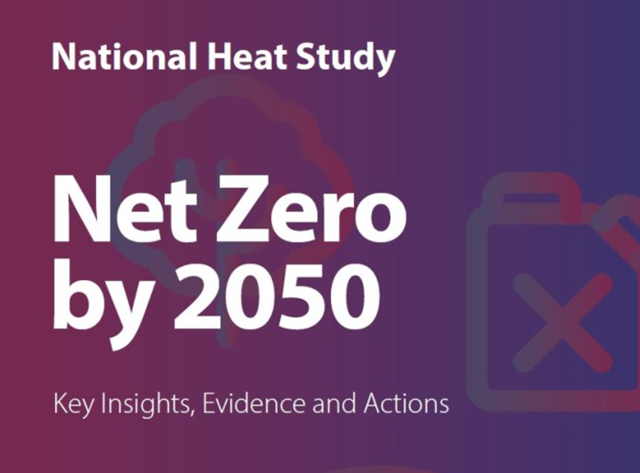
Date: 22 Feb 2022
Net Zero by 2050
Key Insights, Evidence and Actions
The Sustainable Energy Authority of Ireland (SEAI) has published the National Heat Study, a comprehensive assessment of the options available to decarbonise Ireland's energy used for heating across all sectors. The study provides insights and proposed actions to decarbonise the sector. Ultimately the report reinforces the need for urgent and effective climate action.
Minister for the Environment, Climate and Communications, Eamon Ryan, said that “this National Heat Study is a rigorous analysis of the options, pathways and timelines of eliminating CO2 emissions associated with heating in Ireland, to remain within our carbon budgets and to achieve net-zero by 2050. It’s clear that fast deployment of existing solutions plays a key role. However, new-to-Ireland technologies like district heating will play a large role in the decarbonisation of our heat sector. Actions required to deliver our 2050 objective will be addressed in the 2022 Climate Action Plan; this study is a key input to that work.”
Using the National Energy Modelling Framework (NEMF), developed by SEAI, the analysis models four separate pathways to get to net zero emissions from heat energy use by 2050 and compares these to a Baseline scenario. Each scenario represents a different energy system context and approach to decarbonisation. The report showcases how sectors can align with Climate Action policy such as Government’s Climate Action Plan.
The study has highlighted several areas where policy can act to deliver on the heat decarbonisation opportunities. These are broken down into three categories:
-
Actions that can be taken now to contribute to our decarbonisation targets.
-
Technology pathways that require decisions now to provide market certainty and avoid delayed action.
-
Actions that need to be immediately investigated further to support the next wave of policy effort.
Director of Research and Policy Insights at the SEAI Margie McCarthy stated that the heating sector is responsible for no less than almost a quarter of our total greenhouse gases in Ireland. She says that "the key things that are coming out of the study are that we really need to act fast, as with all things climate, but there are some technologies that are ready to deploy right now and at scale."
In conclusion, the ambition of net zero emissions by 2050 will be quite the challenge. This study shows that an unprecedented ramp up of effort and potentially additional measures are needed if the heat sector is to deliver its share of the emissions cuts. The study provides clarity to prioritise and enhance measures to decarbonise heat most effectively . It highlights the absolute necessity of immediate action and efficiently using the best technologies available now.
Find the full report HERE.